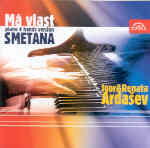Long before the days of radio and recordings, the only way to hear orchestral music at home was to play it on the piano. That’s why hundreds of piano-duet arrangements were published in the late 19th and early 20th centuries. Many of these are more interesting for the participating players than for passive listeners. Yet exceptions abound, such as Smetana’s duet recasting of his entire orchestral tone poem cycle Má Vlast. Smetana understood piano texture more than you’d expect, and he takes great care with registral deployment and knows when and where not to turn on the tremolo effects. What’s more, doubled and broken octaves as well as massive chordal passages never sound clattery or overly dense.
These qualities certainly apply to Igor Ardasev and Renata Ardasevová’s exceptional ensemble synchronicity. Their mutual feeling for color and wide arsenal of articulations nearly erase the original orchestrations from your inner ear. Tempos are perfectly judged, with effortlessly effected transitions and impeccable balances. I doubt most late-19th-century home duetists played this well!
































